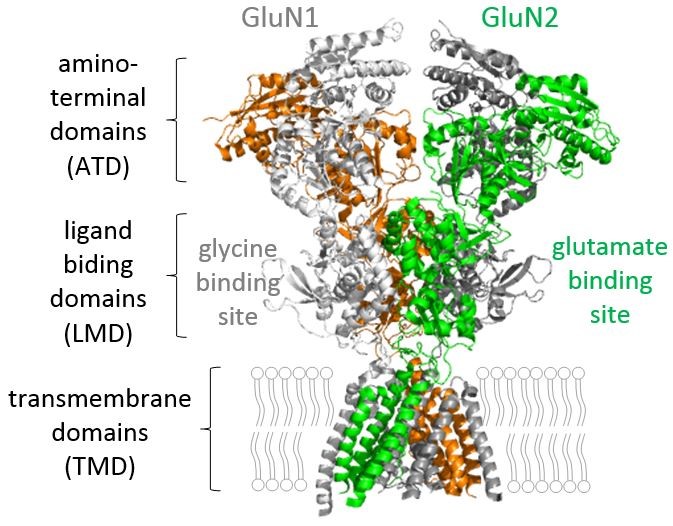Feng Yi, Ph.D.
| Feng Yi, Ph.D. Professor / Principal Investigator Research Interest: NMDA receptor related brain diseases |
Education
2002.09-2006.06 Bachelor of Science in Biology, Minor in Biotechnology, Nanchang University, Jiangxi, China
2006.09-2012.06 Doctoral Candidate, Institute of Neurobiology, Fudan University, Shanghai, China
Experience
2012.06-2015.04 Postdoc Scientist, Center for Structural and Functional Neuroscience, Dept. of Biomedical and Pharmaceutical Sciences, College of Health Professions and Biomedical Sciences, The University of Montana, Missoula, Montana
2015.04-2021.04 Postdoc Res. Assoc., Dept. of Biomedical and Pharmaceutical Sciences, Center for Biomolecular Structure and Dynamics, The University of Montana, Missoula, Montana
2021.05-present Professor, Guangdong-Hong Kong-Macao Greater Bay Area Center for Brain Science and Brain-Inspired Intelligence, Southern Medical University, China.
Research Interest
NMDA receptors (NMDARs) are crucially involved in numerous brain functions. The physiological roles of NMDARs are shaped by their functional properties, which are highly dependent on subunit composition. Most NMDARs are assembled from two GluN1 and two GluN2 or GluN3 subunits. NMDARs with specific subunits composition display distinct regional and developmental expression. For these reasons, there has been widespread interest in understanding the structure, function, and regulation of NMDARs for the purpose of developing new treatments for a number of diseases.

The overarching themes of my research are to understand the structure-function relationship of NMDARs, to explore how NMDARs tune brain functions, and to develop ways to selectively manipulate the involvement of specific NMDA receptor subtypes in physiological and pathological conditions.
One of my two special interests is about the NMDA receptor mutation related brain diseases such as epilepsy and dementia. Some de novo mutations in NMDA receptor subunits have been found to cause epilepsy and/or dementia. Studies about the properties of NMDA receptors with mutations are needed to provide key information for the treatment of relevant diseases. The other one of my special interests is about the relationship of NMDA receptors and schizophrenia. The NMDA receptor hypofunction hypothesis of schizophrenia has been suggested for a long time but remains unclear. Detailed studies at NMDA receptor subunit level and neural circuit level are of significance to this field.
Publications
1. F. Zhao, L. Jiang, J. Xie, N. Liu, Z. Gao, Y. Yang, Y. Wang, B. Huang, D. Kang, P. Zhan*, F. Yi*, X. Liu*, Discovery of Brain-Penetrative Negative Allosteric Modulators of NMDA Receptors Using FEP-Guided Structure Optimization and Membrane Permeability Prediction, J Chem Inf Model 65(2) (2025) 857-872.
2. F. Yi, T. Garrett, K. Deisseroth, H. Haario, E. Stone, J.J. Lawrence, Septohippocampal transmission from parvalbumin-positive neurons features rapid recovery from synaptic depression, Sci Rep 11(1) (2021) 2117.
3. F. Yi, N. Rouzbeh, K.B. Hansen, Y. Xu, C.M. Fanger, E. Gordon, K. Paschetto, F.S. Menniti, R.A. Volkmann, PTC-174, a positive allosteric modulator of NMDA receptors containing GluN2C or GluN2D subunits, Neuropharmacology 173 (2020) 107971.
4. F. Yi, S. Bhattacharya, C.M. Thompson, S.F. Traynelis, K.B. Hansen, Functional and pharmacological properties of triheteromeric GluN1/2B/2D NMDA receptors, The Journal of physiology 597(22) (2019) 5495-5514.
5. F. Yi, L.G. Zachariassen, K.N. Dorsett, K.B. Hansen, Properties of Triheteromeric N-Methyl-d-Aspartate Receptors Containing Two Distinct GluN1 Isoforms, Molecular pharmacology 93(5) (2018) 453-467.
6. F. Yi, T.C. Mou, K.N. Dorsett, R.A. Volkmann, F.S. Menniti, S.R. Sprang, K.B. Hansen, Structural Basis for Negative Allosteric Modulation of GluN2A-Containing NMDA Receptors, Neuron 91(6) (2016) 1316-1329.
下一条:Xin Luo, Ph.D.



